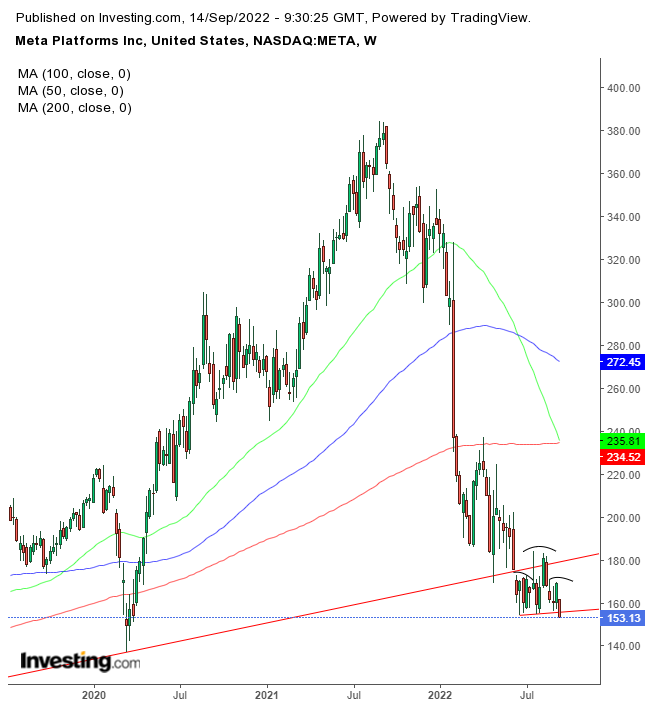Investors dumped Meta Platforms (NASDAQ:META) shares like they were infected with COVID yesterday. The stock plummeted 9.4% after the U.S. consumer-price index revealed that inflation spread beyond sensitive sectors, latching on to the broader economy.
Given that gas prices were falling significantly, experts like Goldman Sachs chief economist expected that the CPI was "going to be another soft one." However, he did say, "the core is the question."
The core inflation rate is the Fed's preferred measure, as it discounts volatile food and energy prices. That measure jumped 0.6%, twice the pace of the prior month's increase as well as the current month's consensus, pushing up the annual core rate to 6.3% from 5.9%
Soaring inflation prompted Nomura Securities to predict a 100 basis-point hike for the first time since the 1980s.
Higher interest rates particularly dent valuations of growth companies including technology, as investors rotate into neglected cyclical stocks that now offer value.
This paradigm is evident when comparing the benchmark averages. Yesterday, the tech-heavy Nasdaq 100 underperformed, losing 5.5% of value, while the Dow Jones, representing value shares, outperformed, retreating just 3.9%.
When digging deeper and looking across S&P 500 sectors, we can see the same pattern. Communications Services and Technology suffered the most, losing 5.5% and 5.3%, respectively.
So Meta wasn't the only social-media platform that stumbled but it did underperform, doubling the losses of some other social media.
Opinions are divided on Meta. Harvard Business school senior fellow Bill George, who studies leaders blames Mark Zucherber's leadership shortcomings for the social network's underperformance. While CNBC's Jim Cramer believes that Zuckerberg has proven himself with creating a multi-billion dollar business and will therefore likely succeed again.
Let's see what the forces of supply and demand say.

Meta completed an H&S continuation pattern, which developed after the price violated its uptrend line since 2013. These breakouts statistically trigger a market chain reaction to repeat the size of the structure downwards, aiming at $126, as the 50-week moving average (WMA) bears down on the 200 WMA for a weekly Death Cross for the first time since the company's inception.
Trading Strategies
Conservative traders should wait for the price to close below $150 while remaining below $155 till the weekend, then wait for a return move that will prove the neckline's resistance before risking a short.
Moderate traders should wait for a close below $150, then wait for the throwback to reduce exposure.
Aggressive traders may short according to their risk aversion.
Trade Sample - Aggressive Short
- Entry: $155
- Stop-Loss: $160
- Risk: $5
- Target: $130
- Reward: $25
- Risk-Reward Ratio: 1:5
Author Note: I am not in the business of fortune telling. I am sharing my interpretation of the technical analysis. Nothing more. You must develop a strategy incorporating your time, budget, and temperament. Meanwhile, you can use my generic sample to learn, not profit, or you'll end up with neither. Guaranteed. No money back.
